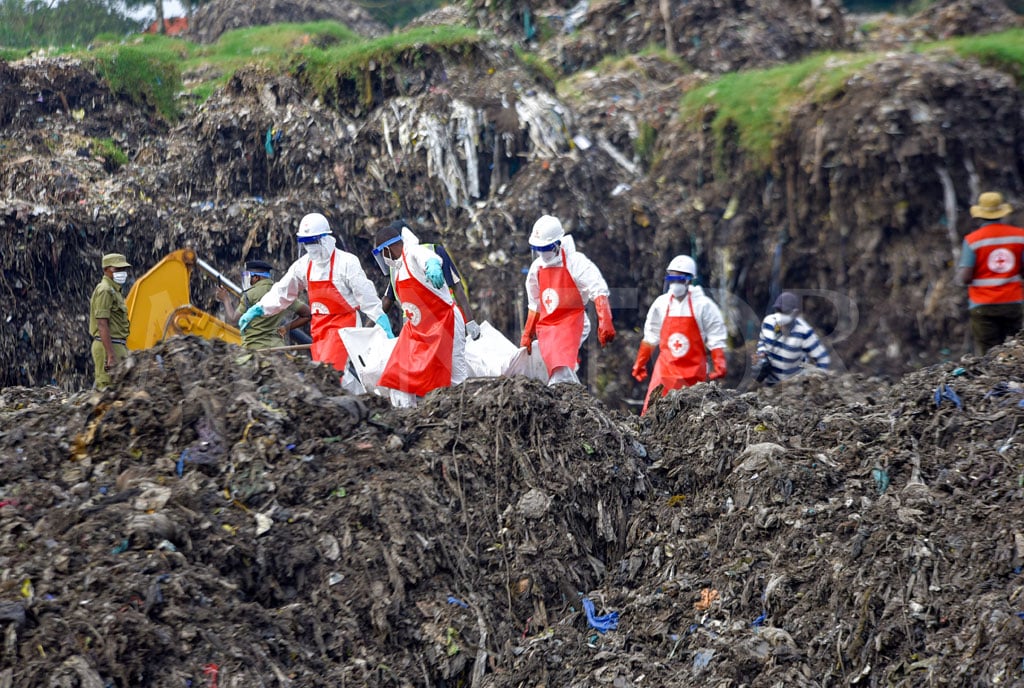
Traders go about their businesses in downtown Kampala amid uncollected heaps of garbage on August 15, 2024. PHOTOs | STEPHEN OTAGE
Experts have warned of a looming outbreak of communicable diseases after towering heaps of uncollected solid waste dwarfed vendors in markets, choked shoppers and spilled to block some busy streets across Kampala’s five divisions.
Public health academics and practitioners put residents of Uganda’s capital on alert that the occurrences of cholera, dysentery and diarrhoea were more likely after City Hall stopped collecting garbage because it has nowhere to dump it.
This followed the collapse last Saturday of Kiteezi landfill-turned-dumpsite in Wakiso District, killing dozens of residents, and the last-minute revocation by Entebbe Municipality of a permission that Katabi Town Council granted Kampala Capital City Authority (KCCA) to use its dumpsite.
Entebbe Mayor Fabrice Rulinda on Wednesday led a charge to turn away a column of loaded garbage trucks emblazoned with KCCA’s official red-yellow-green colours, plunging City Hall into a deeper hole of piling waste.
“In addition to cholera and diarrhoea, you are likely to see diseases [like eye infections] caused by house flies that are attracted by rotten foods multiplying. The smell from rotten garbage is likely to affect people with respiratory conditions such as asthma patients,” warned Prof Fred Ssengooba, a public health expert.
Kampala officials previously said the capital generates up to 2,500 tonnes of solid waste every 24 hours – with an estimated 1,500 collected and disposed of daily.
This would suggest the volume of uncollected garbage over the past six days from Saturday grosses 15,000 tonnes, which academics now warn is a recipe for disaster.
Peter Waiswa, an associate professor at Makerere University School of Public Health, said biodegradable waste becomes a source of food for germs, harbours flies, mosquitoes, bacteria and worms.

Traders collect rubbish at Nakawa Market.
“This can cause infections such as dysentery and cholera, among other diseases. Such garbage may also be a breeding place for mosquitoes which cause malaria among the population. Some of the biodegradable things, unfortunate things like placentas… can cause a lot of [other] infections like hepatitis,” he said.
Prof Waiswa added: “So, it [the city] is unsafe and nobody is safe even if you stay in [the city’s upscale] Kololo [neighbourhood] or in State House because we don’t know whom we are meeting [and] we are exchanging money all over [yet] we are poor at hand washing [and] we are congested.”
The alarm bells tolled by the experts over the towering garbage heaps ran into muted response by KCCA Director of Public Health, Dr Daniel Okello.
Letters he authored in January and July, this year, informing Executive Director Dorothy Kisaka and Deputy Luyimbazi of the imminent collapse of Kiteezi waste dump surfaced on social media on Wednesday, exposing the top technocrats to harsh scrutiny as having done nothing despite prior alerts.

At Kelerwe Market, garbage remained uncollected yesterday.
Hours later, Eng Luyimbazi told this publication that Dr Okello failed over six months to cost the remedial interventions he first proposed in January even as demanded by the ED to inform resource mobilisation choices.
As the ping pong at City Hall where Lord Mayor Erias Lukwago has called for heads to roll over what he called “criminal negligence” continued, outside Kiteezi fiasco, questions piled on the safety of all those living, working or transiting through Kampala.
The capital’s resident population is about 3 million, according to the latest census figures, although the day-time numbers are much higher because most people who work in Kampala live in neighbouring Wakiso and Mukono Districts while thousands transit from upcountry through the city.
Analysts warned yesterday that such mobility, including traders who ply to and return from the capital in a day of merchandise purchase, shows that the spread of an epidemic outbreak in Kampala to the countryside could easily be accelerated.
Our reporters visited markets, business hubs and public open spaces in the city’s divisions and found uncollected garbage towering above vendors and in some cases spilling over to block streets.
The situation
Strong winds yesterday afternoon blew some of the waste to litter commercial and residential premises before a downpour washed bits to block drainage channels, leading to flooding from backflows, while soaked garbage heaps expanded the planet for mosquitos to breed.
Waste bins installed along streets and at public places were overflowing with garbage.

Garbage on Market Street generated by Nakasero Market.
At Nakasero and St Balikuddembe, the main markets in the inner city, fetid smell greeted vendors, passersby and grocery buyers.
Ms Susan Nalwanga, the administrator of Nakasero Market, downplayed the crisis, saying City Hall was trying its best to pick up trash and garbage.
However, some vendors speaking on condition of anonymity to avoid being victimised, said no garbage from the market had been collected for the fourth day yesterday, and the odour nuisance was turning away customers.
According to Mr Jackson Kiiza, the officer-in-charge of garbage collection at Nakawa Market, east of the city centre, garbage has piled there since Kiteezi’s catastrophic structural failure on the weekend.
North of the city centre, in Kalerwe Market, the situation was no different as in the rest of Kawempe Division.
Mr Abdul Mugisha, the chairman Akwata Empola market, said they last emptied their garbage skips exactly a week ago today - on the eve of the landfill collapse.
In Nakulabye township of Kampala’s western Rubaga Division, sacks and plastic bags packed with solid waste were strewn on streets and outside homes.
Our reporter saw a KCCA truck overloaded with garbage at Busega market, but heaps remained on the ground.
Mr Jonathan Ssemakadde, a carpenter at Kibuye Market, told this publication that they were worried that there was likely to be a disease outbreak as a result of the garbage piled along the roads.
“Now that the garbage has piled up along the road, even our customers have nowhere to park their cars to buy from us. [The] government should look for a long-lasting solution for garbage,” he said.
According to Sulaiman Gidungo, the chairman Bivamuntuyo Market, they now order transporters of matooke – a staple in central Uganda – to return with the bulky peels following the abrupt closure of Kiteezi dumpsite.
The solid waste management headache has spread beyond the capital to engulf Wakiso and Mukono, both of which relied on Kiteezi for waste dumping.
KCCA response
KCCA Deputy Executive Director Luyimbazi told this publication last evening that their hands were tied because they had nowhere to dump the accumulating garbage.
“We wrote to Entebbe Municipal [Council] officials [yesterday] morning, requesting for permission and they are going to give it [to us]…..the mayor of Entebbe had stopped us [on Wednesday] and we are hoping to get the response [yesterday],” he said.
He added: “We are hoping to dump [solid waste] there for between one and two months.... they have assured us of a positive reply …”
Compiled by Busein Samilu, Sylivia Katushabe & Stephen Otage.








